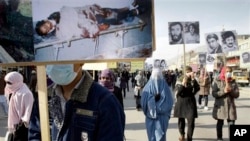ISLAMABAD —
In its annual global report released Thursday, Human Rights Watch warns that any plans by the international community to decrease aid to Afghanistan as foreign troops leave the country raises the risk of increased human rights abuses in the country.
With international troops set to leave Afghanistan in 2014, the New York-based rights group says that both anti-government and pro-government forces are guilty of human rights abuses. While the Taliban and other militant groups routinely target and harm civilians, the report indicates, Afghan authorities continue to allow warlords and human rights abusers to operate with impunity.
The result is a civilian population caught in the crossfire.
Mohammed Musa Mahmoodi, executive director of the Independent Human Rights Commission of Afghanistan, says the country has made considerable strides in improving the lives of Afghans in the past decade, but acknowledges more needs to be done.
"Despite all these progresses we have made there are enormous challenges as well," he said. "Insecurity is one of them. Unfortunately, the continuation of war and conflict in Afghanistan has caused a lot of problems to many Afghan civilians."
The report also describes a situation that remains particularly bad for women, with government officials failing to respond effectively to constant militant threats and attacks on female leaders and schoolgirls. The report also cites instances of Afghan police arresting women for trying to escape forced marriages or domestic violence rather than protecting them.
Lawmaker Shinkai Karokhail says that although withdrawal of international troops may see further violence, she remains hopeful.
"We might face lots of challenges, but I am absolutely optimistic we are not going to lose our achievements," she said. "We might face challenges — maybe our progress, our participation might be delayed — but still I am hopeful that we still could maintain."
But according to Heather Barr, Human Rights Watch's expert in Afghanistan, even maintaining the country's recent achievements could prove challenging, and much could be lost if the international community turns its back on Afghanistan in the coming years.
"Afghanistan doesn't have any unnecessary clinics, Afghanistan doesn't have an excessive number of schools," she said. "So any services like this that are lost due to cuts in international funding are going to have an immediate impact on human rights in the country."
Although donors are publicly committed to Afghanistan, Barr says, funds are being cut behind closed doors. As a result, some non-governmental organizations say they are starting to end programs and that this trend is likely to continue.
With international troops set to leave Afghanistan in 2014, the New York-based rights group says that both anti-government and pro-government forces are guilty of human rights abuses. While the Taliban and other militant groups routinely target and harm civilians, the report indicates, Afghan authorities continue to allow warlords and human rights abusers to operate with impunity.
The result is a civilian population caught in the crossfire.
Mohammed Musa Mahmoodi, executive director of the Independent Human Rights Commission of Afghanistan, says the country has made considerable strides in improving the lives of Afghans in the past decade, but acknowledges more needs to be done.
"Despite all these progresses we have made there are enormous challenges as well," he said. "Insecurity is one of them. Unfortunately, the continuation of war and conflict in Afghanistan has caused a lot of problems to many Afghan civilians."
The report also describes a situation that remains particularly bad for women, with government officials failing to respond effectively to constant militant threats and attacks on female leaders and schoolgirls. The report also cites instances of Afghan police arresting women for trying to escape forced marriages or domestic violence rather than protecting them.
Lawmaker Shinkai Karokhail says that although withdrawal of international troops may see further violence, she remains hopeful.
"We might face lots of challenges, but I am absolutely optimistic we are not going to lose our achievements," she said. "We might face challenges — maybe our progress, our participation might be delayed — but still I am hopeful that we still could maintain."
But according to Heather Barr, Human Rights Watch's expert in Afghanistan, even maintaining the country's recent achievements could prove challenging, and much could be lost if the international community turns its back on Afghanistan in the coming years.
"Afghanistan doesn't have any unnecessary clinics, Afghanistan doesn't have an excessive number of schools," she said. "So any services like this that are lost due to cuts in international funding are going to have an immediate impact on human rights in the country."
Although donors are publicly committed to Afghanistan, Barr says, funds are being cut behind closed doors. As a result, some non-governmental organizations say they are starting to end programs and that this trend is likely to continue.
